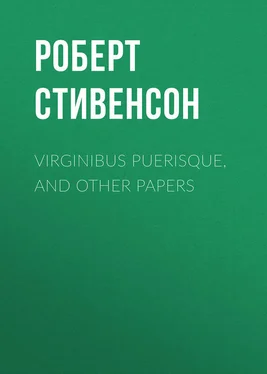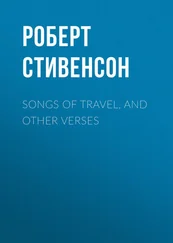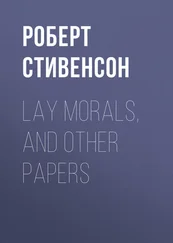Роберт Стивенсон - Virginibus Puerisque, and Other Papers
Здесь есть возможность читать онлайн «Роберт Стивенсон - Virginibus Puerisque, and Other Papers» — ознакомительный отрывок электронной книги совершенно бесплатно, а после прочтения отрывка купить полную версию. В некоторых случаях можно слушать аудио, скачать через торрент в формате fb2 и присутствует краткое содержание. Жанр: literature_19, foreign_antique, foreign_prose, на английском языке. Описание произведения, (предисловие) а так же отзывы посетителей доступны на портале библиотеки ЛибКат.
- Название:Virginibus Puerisque, and Other Papers
- Автор:
- Жанр:
- Год:неизвестен
- ISBN:нет данных
- Рейтинг книги:4 / 5. Голосов: 1
-
Избранное:Добавить в избранное
- Отзывы:
-
Ваша оценка:
- 80
- 1
- 2
- 3
- 4
- 5
Virginibus Puerisque, and Other Papers: краткое содержание, описание и аннотация
Предлагаем к чтению аннотацию, описание, краткое содержание или предисловие (зависит от того, что написал сам автор книги «Virginibus Puerisque, and Other Papers»). Если вы не нашли необходимую информацию о книге — напишите в комментариях, мы постараемся отыскать её.
Virginibus Puerisque, and Other Papers — читать онлайн ознакомительный отрывок
Ниже представлен текст книги, разбитый по страницам. Система сохранения места последней прочитанной страницы, позволяет с удобством читать онлайн бесплатно книгу «Virginibus Puerisque, and Other Papers», без необходимости каждый раз заново искать на чём Вы остановились. Поставьте закладку, и сможете в любой момент перейти на страницу, на которой закончили чтение.
Интервал:
Закладка:
Again, the husband, in these unions, is usually a man, and the wife commonly enough a woman; and when this is the case, although it makes the firmer marriage, a thick additional veil of misconception hangs above the doubtful business. Women, I believe, are somewhat rarer than men; but then, if I were a woman myself, I daresay I should hold the reverse; and at least we all enter more or less wholly into one or other of these camps. A man who delights women by his feminine perceptions will often scatter his admirers by a chance explosion of the under side of man; and the most masculine and direct of women will some day, to your dire surprise, draw out like a telescope into successive lengths of personation. Alas! for the man, knowing her to be at heart more candid than himself, who shall flounder, panting, through these mazes in the quest for truth. The proper qualities of each sex are, indeed, eternally surprising to the other. Between the Latin and the Teuton races there are similar divergences, not to be bridged by the most liberal sympathy. And in the good, plain, cut-and-dry explanations of this life, which pass current among us as the wisdom of the elders, this difficulty has been turned with the aid of pious lies. Thus, when a young lady has angelic features, eats nothing to speak of, plays all day long on the piano, and sings ravishingly in church, it requires a rough infidelity, falsely called cynicism, to believe that she may be a little devil after all. Yet so it is: she may be a tale-bearer, a liar, and a thief; she may have a taste for brandy, and no heart. My compliments to George Eliot for her Rosamond Vincy; the ugly work of satire she has transmuted to the ends of art, by the companion figure of Lydgate; and the satire was much wanted for the education of young men. That doctrine of the excellence of women, however chivalrous, is cowardly as well as false. It is better to face the fact, and know, when you marry, that you take into your life a creature of equal, if of unlike, frailties; whose weak human heart beats no more tunefully than yours.
But it is the object of a liberal education not only to obscure the knowledge of one sex by another, but to magnify the natural differences between the two. Man is a creature who lives not upon bread alone, but principally by catchwords; and the little rift between the sexes is astonishingly widened by simply teaching one set of catchwords to the girls and another to the boys. To the first, there is shown but a very small field of experience, and taught a very trenchant principle for judgment and action; to the other, the world of life is more largely displayed, and their rule of conduct is proportionally widened. They are taught to follow different virtues, to hate different vices, to place their ideal, even for each other, in different achievements. What should be the result of such a course? When a horse has run away, and the two flustered people in the gig have each possessed themselves of a rein, we know the end of that conveyance will be in the ditch. So, when I see a raw youth and a green girl, fluted and fiddled in a dancing measure into that most serious contract, and setting out upon life’s journey with ideas so monstrously divergent, I am not surprised that some make shipwreck, but that any come to port. What the boy does almost proudly, as a manly peccadillo, the girl will shudder at as a debasing vice; what is to her the mere common sense of tactics, he will spit out of his mouth as shameful. Through such a sea of contrarieties must this green couple steer their way; and contrive to love each other; and to respect, forsooth; and be ready, when the time arrives, to educate the little men and women who shall succeed to their places and perplexities.
And yet, when all has been said, the man who should hold back from marriage is in the same case with him who runs away from battle. To avoid an occasion for our virtues is a worse degree of failure than to push forward pluckily and make a fall. It is lawful to pray God that we be not led into temptation; but not lawful to skulk from those that come to us. The noblest passage in one of the noblest books of this century, is where the old pope glories in the trial, nay, in the partial fall and but imperfect triumph, of the younger hero. [1] Browning’s Ring and Book .
Without some such manly note, it were perhaps better to have no conscience at all. But there is a vast difference between teaching flight, and showing points of peril that a man may march the more warily. And the true conclusion of this paper is to turn our back on apprehensions, and embrace that shining and courageous virtue, Faith. Hope is the boy, a blind, headlong, pleasant fellow, good to chase swallows with the salt; Faith is the grave, experienced, yet smiling man. Hope lives on ignorance; open-eyed Faith is built upon a knowledge of our life, of the tyranny of circumstance and the frailty of human resolution. Hope looks for unqualified success; but Faith counts certainly on failure, and takes honourable defeat to be a form of victory. Hope is a kind old pagan; but Faith grew up in Christian days, and early learnt humility. In the one temper, a man is indignant that he cannot spring up in a clap to heights of elegance and virtue; in the other, out of a sense of his infirmities, he is filled with confidence because a year has come and gone, and he has still preserved some rags of honour. In the first, he expects an angel for a wife; in the last, he knows that she is like himself – erring, thoughtless, and untrue; but like himself also, filled with a struggling radiancy of better things, and adorned with ineffective qualities. You may safely go to school with hope; but ere you marry, should have learned the mingled lesson of the world: that dolls are stuffed with sawdust, and yet are excellent play-things; that hope and love address themselves to a perfection never realised, and yet, firmly held, become the salt and staff of life; that you yourself are compacted of infirmities, perfect, you might say, in imperfection, and yet you have a something in you lovable and worth preserving; and that, while the mass of mankind lies under this scurvy condemnation, you will scarce find one but, by some generous reading, will become to you a lesson, a model, and a noble spouse through life. So thinking, you will constantly support your own unworthiness, and easily forgive the failings of your friend. Nay, you will be I wisely glad that you retain the sense of blemishes; for the faults of married people continually spur up each of them, hour by hour, to do better and to meet and love upon a higher ground. And ever, between the failures, there will come glimpses of kind virtues to encourage and console.
III. – ON FALLING IN LOVE
“Lord, what fools these mortals be!”
There is only one event in life which really astonishes a man and startles him out of his prepared opinions. Everything else befalls him very much as he expected. Event succeeds to event, with an agreeable variety indeed, but with little that is either startling or intense; they form together no more than a sort of background, or running accompaniment to the man’s own reflections; and he falls naturally into a cool, curious, and smiling habit of mind, and builds himself up in a conception of life which expects to-morrow to be after the pattern of to-day and yesterday. He may be accustomed to the vagaries of his friends and acquaintances under the influence of love. He may sometimes look forward to it for himself with an incomprehensible expectation. But it is a subject in which neither intuition nor the behaviour of others will help the philosopher to the truth. There is probably nothing rightly thought or rightly written on this matter of love that is not a piece of the person’s experience. I remember an anecdote of a well-known French theorist, who was debating a point eagerly in his cénacle . It was objected against him that he had never experienced love. Whereupon he arose, left the society, and made it a point not to return to it until he considered that he had supplied the defect. “Now,” he remarked, on entering, “now I am in a position to continue the discussion.” Perhaps he had not penetrated very deeply into the subject after all; but the story indicates right thinking, and may serve as an apologue to readers of this essay.
Читать дальшеИнтервал:
Закладка:
Похожие книги на «Virginibus Puerisque, and Other Papers»
Представляем Вашему вниманию похожие книги на «Virginibus Puerisque, and Other Papers» списком для выбора. Мы отобрали схожую по названию и смыслу литературу в надежде предоставить читателям больше вариантов отыскать новые, интересные, ещё непрочитанные произведения.
Обсуждение, отзывы о книге «Virginibus Puerisque, and Other Papers» и просто собственные мнения читателей. Оставьте ваши комментарии, напишите, что Вы думаете о произведении, его смысле или главных героях. Укажите что конкретно понравилось, а что нет, и почему Вы так считаете.












